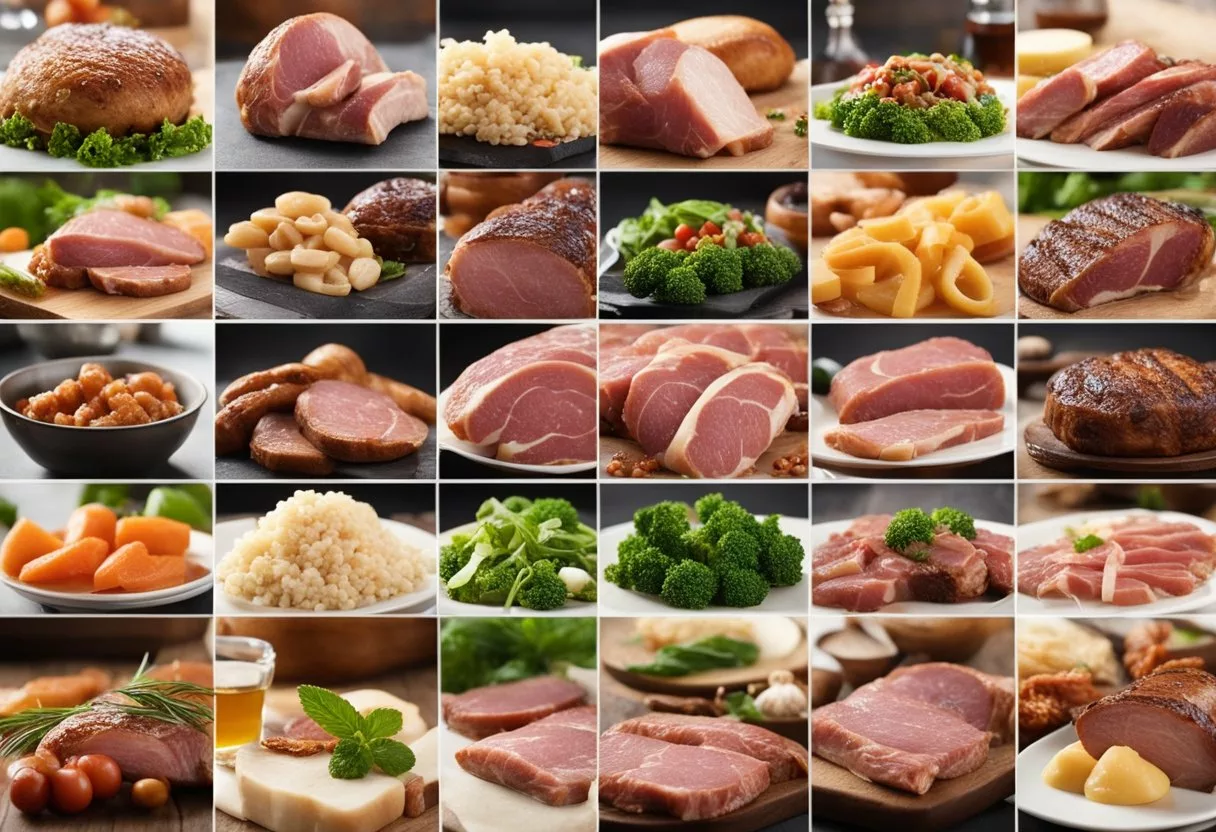Eating meat is a common practice in many cultures and is a significant source of protein. However, consuming meat every day can have both positive and negative effects on the body. While meat is a good source of protein, it can also contain high levels of saturated fats and cholesterol, which can increase the risk of heart disease and other health problems.
According to various studies, consuming red meat every day can increase the risk of developing certain types of cancer, such as colorectal cancer. Additionally, processed meats such as bacon, sausages, and hot dogs, have been linked to an increased risk of heart disease, type 2 diabetes, and other health problems. While meat is an important part of a balanced diet, it is important to consume it in moderation and to choose lean cuts of meat whenever possible.
Nutritional Impact of Daily Meat Consumption

Eating meat every day can have a significant impact on the nutritional balance of one’s diet. While meat is a good source of protein, essential amino acids, iron, and vitamin B12, it also contains high levels of saturated fat and cholesterol.
Protein and Amino Acids
Meat is a complete protein source, which means it contains all the essential amino acids that the body needs. The body uses these amino acids to build and repair tissues, produce enzymes, and synthesize hormones. However, consuming too much protein, especially from animal sources, can put a strain on the kidneys.
Vitamins and Minerals
Meat is also a good source of several essential vitamins and minerals, including iron, zinc, and vitamin B12. Iron is necessary for the production of hemoglobin, which carries oxygen in the blood. Zinc is important for immune function, wound healing, and DNA synthesis. Vitamin B12 is essential for nerve function and the production of red blood cells.
Saturated Fat and Cholesterol
However, eating meat every day can also lead to an overconsumption of saturated fat and cholesterol. High levels of saturated fat and cholesterol in the diet have been linked to an increased risk of heart disease, stroke, and certain types of cancer. Therefore, it is recommended to limit the consumption of red and processed meats and choose leaner cuts of meat when possible.
In conclusion, while meat can provide important nutrients, it is important to consume it in moderation and balance it with other nutrient-rich foods.
Health Risks Associated with Meat Intake

Meat is a staple food in many cultures, and it is a good source of protein, vitamins, and minerals. However, eating meat every day can have negative health consequences. In this section, we will discuss the health risks associated with meat intake.
Cancer Risk Factors
Studies have shown that consuming red meat and processed meat can increase the risk of colorectal cancer. The World Health Organization (WHO) has classified processed meat as a Group 1 carcinogen, which means it is a substance that can cause cancer in humans. The WHO also classified red meat as a Group 2A carcinogen, which means it is probably carcinogenic to humans. The carcinogenic properties of red and processed meat are thought to be due to the presence of a compound called heme iron, which can cause DNA damage and promote the growth of cancer cells.
Heart Disease and Stroke
Eating meat every day can increase the risk of heart disease and stroke. This is because meat, especially red meat, is high in saturated fat and cholesterol, which can raise blood cholesterol levels and increase the risk of developing heart disease and stroke. A diet high in red and processed meat has also been linked to high blood pressure, another risk factor for heart disease and stroke.
Type 2 Diabetes and Obesity
Eating meat every day can also increase the risk of developing type 2 diabetes and obesity. A diet high in red and processed meat has been linked to insulin resistance, a condition where the body’s cells become less responsive to insulin, leading to high blood sugar levels. Insulin resistance is a major risk factor for type 2 diabetes. Additionally, a diet high in red and processed meat is often high in calories, which can contribute to weight gain and obesity.
In conclusion, consuming meat every day can have negative health consequences, including an increased risk of cancer, heart disease, stroke, type 2 diabetes, and obesity. To reduce these risks, it is recommended to limit meat intake and choose lean cuts of meat, such as chicken or fish, and to incorporate more plant-based protein sources into the diet.
Digestive System and Meat Consumption
Impact on Gut Health
Meat consumption can have a significant impact on gut health. A diet high in meat and low in fiber and carbohydrates can lead to constipation and other digestive problems. According to a study by the World Cancer Research Fund and the American Institute for Cancer Research, consuming more than 18 ounces of red meat per week can increase the risk of colon cancer.
On the other hand, a diet rich in fiber and plant-based foods can promote gut health by nourishing the beneficial bacteria in the gut. These bacteria help break down food and absorb nutrients, while also aiding in digestion and reducing inflammation.
Meat and Digestion Rate
Meat is generally harder to digest than plant-based foods. It takes longer for the body to break down and process meat, which can result in slower digestion rates and constipation. Additionally, consuming large amounts of meat can cause the body to produce more acid, which can lead to digestive discomfort and heartburn.
It is important to note that everyone’s digestive system is different, and some people may be able to tolerate more meat than others. However, it is generally recommended to consume meat in moderation and to balance it out with plenty of fiber and plant-based foods to promote optimal gut health.
Comparing Meat Types and Sources

Processed vs. Unprocessed Meat
Processed meats such as hot dogs, bacon, and sausages are often high in salt, saturated fat, and preservatives. According to a Mayo Clinic article, regular consumption of processed meats has been linked to an increased risk of heart disease, type 2 diabetes, and cancer. On the other hand, unprocessed meats such as lean cuts of beef, pork, lamb, and poultry are generally healthier options.
Red Meat vs. White Meat
Red meat, such as beef and pork, is often higher in saturated fat and cholesterol compared to white meat, such as poultry and fish. However, red meat is also a good source of nutrients such as iron and vitamin B12. It is recommended to limit consumption of red meat and choose lean cuts to reduce the risk of heart disease. White meat, on the other hand, is generally a healthier option due to its lower fat content.
Grass-Fed and Organic Options
Grass-fed beef is often considered a healthier option compared to conventionally raised beef. Grass-fed beef contains higher levels of omega-3 fatty acids and conjugated linoleic acid (CLA), which have been linked to various health benefits such as reduced inflammation and improved heart health. Organic meat, on the other hand, is produced without the use of antibiotics and growth hormones, which may have negative effects on health. However, it is important to note that grass-fed and organic options may be more expensive and not as widely available as conventionally raised meat.
In summary, choosing unprocessed, lean cuts of meat and limiting consumption of processed and red meat can help reduce the risk of various health issues. Grass-fed and organic options may also be healthier choices, but they may not be as accessible or budget-friendly for everyone.
Balancing Meat in Your Diet

Role of Moderation
While meat can be a good source of protein and other nutrients, consuming it in excess can have negative effects on health. As such, moderation is key when it comes to incorporating meat into a healthy diet. The Dietary Guidelines for Americans recommend consuming no more than 26 ounces of meat per week, which equates to roughly 3-4 servings.
Incorporating Plant-Based Foods
To balance out meat intake, incorporating plant-based foods such as fruits, vegetables, legumes, and nuts can be beneficial. These foods are high in fiber, vitamins, and minerals, and can help reduce the risk of chronic diseases such as heart disease and certain types of cancer. Soy products such as tofu and tempeh can also be a good source of protein for those looking to reduce their meat intake.
Consulting Dietary Guidelines
For personalized advice on balancing meat intake with other foods, consulting a registered dietitian can be helpful. They can provide guidance on how to incorporate a variety of foods into a balanced diet that meets individual nutrient needs. Additionally, following the Dietary Guidelines for Americans can provide a framework for healthy eating habits.
By practicing moderation and incorporating plant-based foods, individuals can enjoy the benefits of meat while maintaining a balanced and healthy diet.
Lifestyle and Consumption Patterns

Meat and Physical Activity
Physical activity plays a crucial role in maintaining one’s health and well-being. It is important to note that a person’s daily meat consumption can affect their physical activity levels. Meat is a good source of protein, which is essential for building and repairing muscle tissue. However, excessive consumption of meat can lead to weight gain and a decrease in energy levels, both of which can negatively impact physical activity.
Studies have shown that a diet high in red meat can lead to decreased physical activity levels and increased risk of obesity. In contrast, a diet high in lean protein sources, such as fish and chicken, has been associated with increased physical activity and weight loss.
Cultural and Personal Preferences
Cultural and personal dietary preferences can also influence a person’s meat consumption patterns. In some cultures, meat is a staple food item and is consumed daily. In other cultures, meat is consumed only on special occasions or not at all.
Personal dietary choices, such as vegetarianism or veganism, can also impact a person’s meat consumption patterns. These dietary choices can be influenced by a variety of factors, including ethical concerns, health concerns, and personal taste preferences.
It is important to note that there is no one-size-fits-all approach to meat consumption. The amount and type of meat a person consumes should be based on their individual needs and preferences. A balanced diet that includes a variety of protein sources, including lean meats, fish, and plant-based sources, can provide the necessary nutrients for optimal health and well-being.
Alternatives to Meat Consumption

Plant-Based Protein Sources
For those looking to reduce their meat intake, there are plenty of plant-based protein sources available. Legumes, such as lentils, chickpeas, and black beans, are a great source of protein and can be used in a variety of dishes, such as stews, salads, and veggie burgers. Nuts, such as almonds, cashews, and peanuts, are also a good source of protein and can be enjoyed as a snack or added to dishes for extra flavor and texture.
In addition to legumes and nuts, there are many other plant-based protein sources to consider. Quinoa, for example, is a versatile grain that is high in protein and can be used in place of rice or pasta. Tofu and tempeh are soy-based products that are also high in protein and can be used in a variety of dishes, such as stir-fries and sandwiches.
Transitioning to a Vegetarian or Vegan Diet
For those looking to transition to a vegetarian or vegan diet, it’s important to do so gradually and with a plan. A sudden change in diet can be difficult to sustain and can lead to nutrient deficiencies if not done properly.
One way to ease into a plant-based diet is to start by incorporating more vegetarian meals into your diet. This could mean having a meatless Monday or replacing meat with plant-based protein sources in some of your favorite dishes.
Another option is to gradually eliminate meat from your diet, starting with red meat and then moving on to poultry and fish. This can help you adjust to the change and ensure that you are still getting the nutrients you need.
It’s also important to make sure that you are getting enough protein, iron, and other nutrients in your diet. Dairy products and eggs can be a good source of protein for those who are not vegan, while plant-based eating can provide plenty of iron, calcium, and other essential nutrients.
By incorporating a variety of plant-based protein sources into your diet and making the transition gradually, you can enjoy the health benefits of a plant-based diet while still getting the nutrients you need.